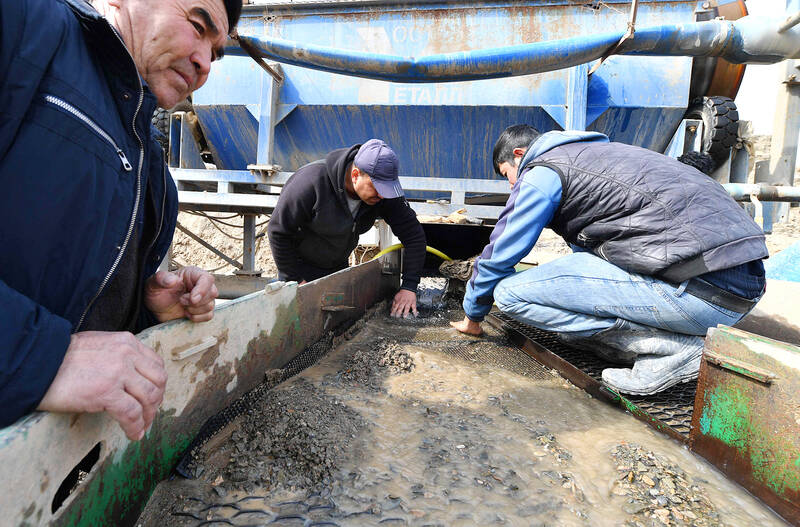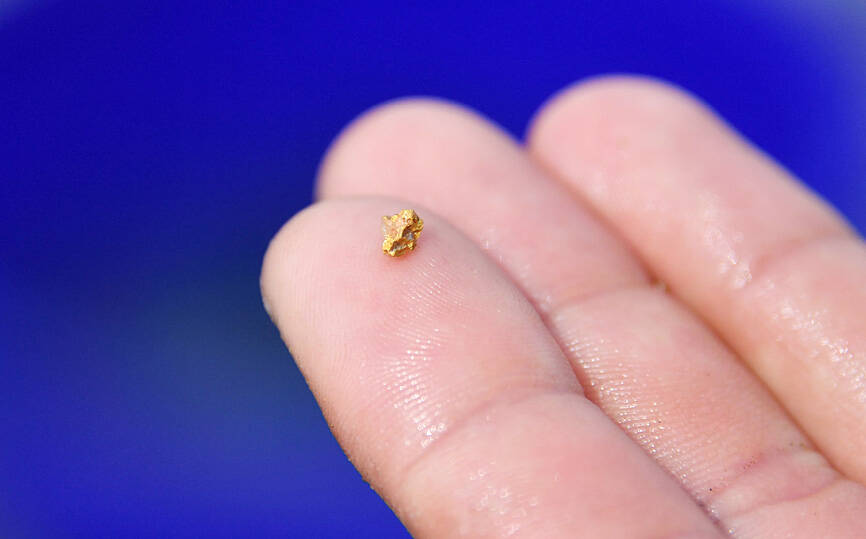Sifting through a grayish mixture of sand and pebble in the steppe of Uzbekistan, Khislat Ochilov was searching for gold.
He is one of hundreds of new prospectors trying to strike it rich in a modern-day gold rush in the Central Asian country, chock-full of the precious metal.
A right once preserved for state mining firms, recent regulatory changes designed to boost the economy mean anyone can hunt for gold.

Photo: AFP
Ochilov scanned the shiny flakes that appeared on his panning mat, submerged in a pool of water. Finally, he spotted a piece the size of a grain of rice.
“Not bad, though my record is 7g,” the 25-year-old said, while out in the Uzbek steppe, near the southwestern village of Soykechar.
Nearby, Sardor Mardiyev, 28, was hard at work digging through the earth in the vast Navoi Region, a district larger than Portugal.

Photo: AFP
He drives his excavator 12 hours a day, six days a week as part of a frenzy for the metal that officials hope will boost Uzbekistan’s output.
Last year, the country produced 110.8 tonnes of gold, putting it 10th place globally, and its central bank was the second-largest net seller in the world at about 25 tonnes, behind only Kazakhstan, World Gold Council data showed.
For Uzbek President Shavkat Mirziyoyev — who sees himself as a reformer opening up and liberalizing his country’s economy after years of isolation and centralization — it is not enough.

Photo: AFP
He has ordered gold production to be increased by 50 percent by 2030. The potential is there — only 20 percent of Uzbekistan’s subsoil has been explored to date.
Mirziyoyev, in power since 2016, has also called for gold bars weighing up to 1kg to be sold in the hopes of drawing more tourists to his landlocked Central Asian nation.
Zahit Khudaberdiyev, in his 30s, is among hundreds of entrepreneurs who have decided to try their luck since the regulation change. To join the gold rush he acquired the rights to a plot of land for three years at auction.
“Before 2019, we didn’t have the right to mine gold. Some did it anyway at the risk of death — it was dangerous,” Khudaberdiyev said.
His competition includes Kazakh and Chinese prospectors who secured neighboring plots.
If this one does not prove bountiful, he would look further afield, he said.
Behind Khudaberdiyev, trucks and diggers bustle with activity.
They churn up tonnes of rubble and can help scourers unearth a daily average of 12g to 15g, he said.
As he spoke, he had one eye glued to his phone, monitoring global gold prices.
This month, they climbed to a record high of US$2,200 per troy ounce (31.1g).
“The government decided to issue such plots for gold mining to provide work for the population,” he said.
The prospecting rush is providing an unexpected employment boon for a country where 20 percent of workers are forced to go abroad for employment, mainly to Russia.
Khudaberdiyev gave the example of his young employees, locals Ochilov and Mardiyev. Before he hired them, one was unemployed, the other a farm hand.
Now they earn 3 million to 4 million som US$237.88 to US$317.18 on average each month, Khudaberdiyev said — a decent salary for the region.
The new wave of gold miners are not allowed to do as they please with the gold they dig up. All of it must be funneled through the Uzbek central bank, which trades it for dollars on the global market.
The country’s growing economy depends on injections of foreign currency to support the national currency. The som has one of the lowest face values in the world, with US$1 worth 12,500 som.
In Soykechar, where farming remains a vital sector, not everyone is thrilled about the gold rush.
“Prospectors dig where we graze our cattle,” said Erkin Karshiev, a leading farmer in the region, about 500km southwest of the capital, Tashkent.
“Look how the last guys left everything,” the 66-year-old farmer said, motioning with frustration to holes a dozen meters deep.
Karshiev said he was “really afraid the animals will fall in,” but his multiple calls on the authorities to resolve the issue have thus far gone ignored.
“We only want one thing: for the gold miners to level the land by filling in the holes when they leave,” he said.

The US dollar was trading at NT$29.7 at 10am today on the Taipei Foreign Exchange, as the New Taiwan dollar gained NT$1.364 from the previous close last week. The NT dollar continued to rise today, after surging 3.07 percent on Friday. After opening at NT$30.91, the NT dollar gained more than NT$1 in just 15 minutes, briefly passing the NT$30 mark. Before the US Department of the Treasury's semi-annual currency report came out, expectations that the NT dollar would keep rising were already building. The NT dollar on Friday closed at NT$31.064, up by NT$0.953 — a 3.07 percent single-day gain. Today,

‘SHORT TERM’: The local currency would likely remain strong in the near term, driven by anticipated US trade pressure, capital inflows and expectations of a US Fed rate cut The US dollar is expected to fall below NT$30 in the near term, as traders anticipate increased pressure from Washington for Taiwan to allow the New Taiwan dollar to appreciate, Cathay United Bank (國泰世華銀行) chief economist Lin Chi-chao (林啟超) said. Following a sharp drop in the greenback against the NT dollar on Friday, Lin told the Central News Agency that the local currency is likely to remain strong in the short term, driven in part by market psychology surrounding anticipated US policy pressure. On Friday, the US dollar fell NT$0.953, or 3.07 percent, closing at NT$31.064 — its lowest level since Jan.

The New Taiwan dollar and Taiwanese stocks surged on signs that trade tensions between the world’s top two economies might start easing and as US tech earnings boosted the outlook of the nation’s semiconductor exports. The NT dollar strengthened as much as 3.8 percent versus the US dollar to 30.815, the biggest intraday gain since January 2011, closing at NT$31.064. The benchmark TAIEX jumped 2.73 percent to outperform the region’s equity gauges. Outlook for global trade improved after China said it is assessing possible trade talks with the US, providing a boost for the nation’s currency and shares. As the NT dollar

The Financial Supervisory Commission (FSC) yesterday met with some of the nation’s largest insurance companies as a skyrocketing New Taiwan dollar piles pressure on their hundreds of billions of dollars in US bond investments. The commission has asked some life insurance firms, among the biggest Asian holders of US debt, to discuss how the rapidly strengthening NT dollar has impacted their operations, people familiar with the matter said. The meeting took place as the NT dollar jumped as much as 5 percent yesterday, its biggest intraday gain in more than three decades. The local currency surged as exporters rushed to